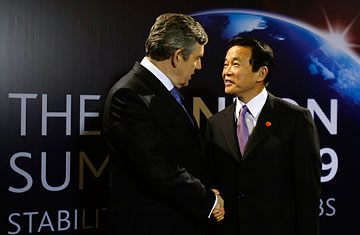
Britain's Prime Minister Gordon Brown greets his Japanese counterpart Taro Aso upon his arrival at the G20 summit in London on April 2, 2009
The night Japan's Prime Minister Taro Aso left for this week's G-20 summit in London, he said at a news conference that he "intended to exert leadership" to bring about concrete, coordinated international efforts to fight the global economic crisis. Now that the summit is being heralded as a success — consensus was reached on plans to clean up banking systems and world leaders pledged more than $1 trillion to support impoverished countries — there's evidence that Japan's embattled Prime Minister may have had an impact.
The question now is whether Aso's performance on the world stage has given a temporary reprieve for his flagging administration. Just six weeks ago, Aso's support rating at home had plunged into the single digits as Japan's recession worsened. Shortly after that poll came out, former Finance Minister Shoichi Nakagawa embarrassed the Aso administration by showing up in what appeared to be an inebriated state at a press conference during a Group of Seven meeting in Rome. Nakagawa later stepped down. (See pictures of Japan and the world.)
Aso managed to avoid missteps during the highly public summit. He said that the G-20 sent "a robust message" by addressing issues such as the importance of fiscal policy and increased regulation of the markets — arguments he was making prior to the London conference. Japan also took the lead in an international effort to shore up the International Monetary Fund with an earlier pledge to provide the organization with up to $100 billion. The G-20 upped the contribution to $500 billion to help emerging countries that are in dire economic straits. "The IMF's fiscal foundation has been strengthened — a very welcomed development," says Yasuhisa Kawamura, deputy press secretary for Japan's foreign ministry. "Japan took the lead toward that goal and we're very happy that our partners joined the call."
At the summit, Japan backed calls by the U.S. for greater fiscal spending to combat the recession — moves opposed by leaders of several European countries including France and Germany, who fear that unchecked government spending will lead to rampant inflation. But Aso dismissed German Chancellor Merkel's caution about fiscal stimulus before heading to London. "The fact that he picked a fight with Merkel plays very well — like he's one of the big boys," says Gerald Curtis, a professor at Columbia University who has written extensively about Japanese politics. "He looks like a leader. Even though people are nervous about increasing the deficit, he's coming across as a leader who has a view on what to do." (Read "Sony's Woes: Japan's Iconic Brands Under Fire.")
While Aso's star turn at the G-20 could help Aso at the polls, the fate of his administration will more likely be decided by his ability to pull Japan out of its economic tailspin. The public's lack of confidence in the government's handling of the economy has benefited the opposition party, the Democratic Party of Japan (DPJ) — so much so that it could wrest control of government from Aso's ruling Liberal Democratic Party (LDP) for the first time in decades in the next general election. There has been speculation that Aso might call an election in May or June to take advantage of a political-contributions scandal surrounding DPJ leader Ichiro Ozawa, but no decision has been made. An election must be held by October.
According to Curtis, the Japanese public may be ready to accept that "maybe Aso is the best we can get right now ... by not making big mistakes, he benefits because the expectations about him are so low."
Japan's economy contracted at an annualized rate of 12.1% in the last quarter of last year — the sharpest downturn since the oil crisis of the mid-1970s. Tokyo is working on an additional stimulus package — the country's third in the last six months — that is expected to pump at least $100 billion more into the economy.
But spending your way out of crisis has its limitations. Next year, Japan's public debt is expected to rise to 197% of GDP, according to the Organization for Economic Cooperation and Development (OECD). That would make Japan's debt ratio the highest among OECD nations and nearly twice that of the U.S. "If they spend money without reform, they can get growth," says Curtis. "But they will just increase the deficit and it won't be sustainable."
